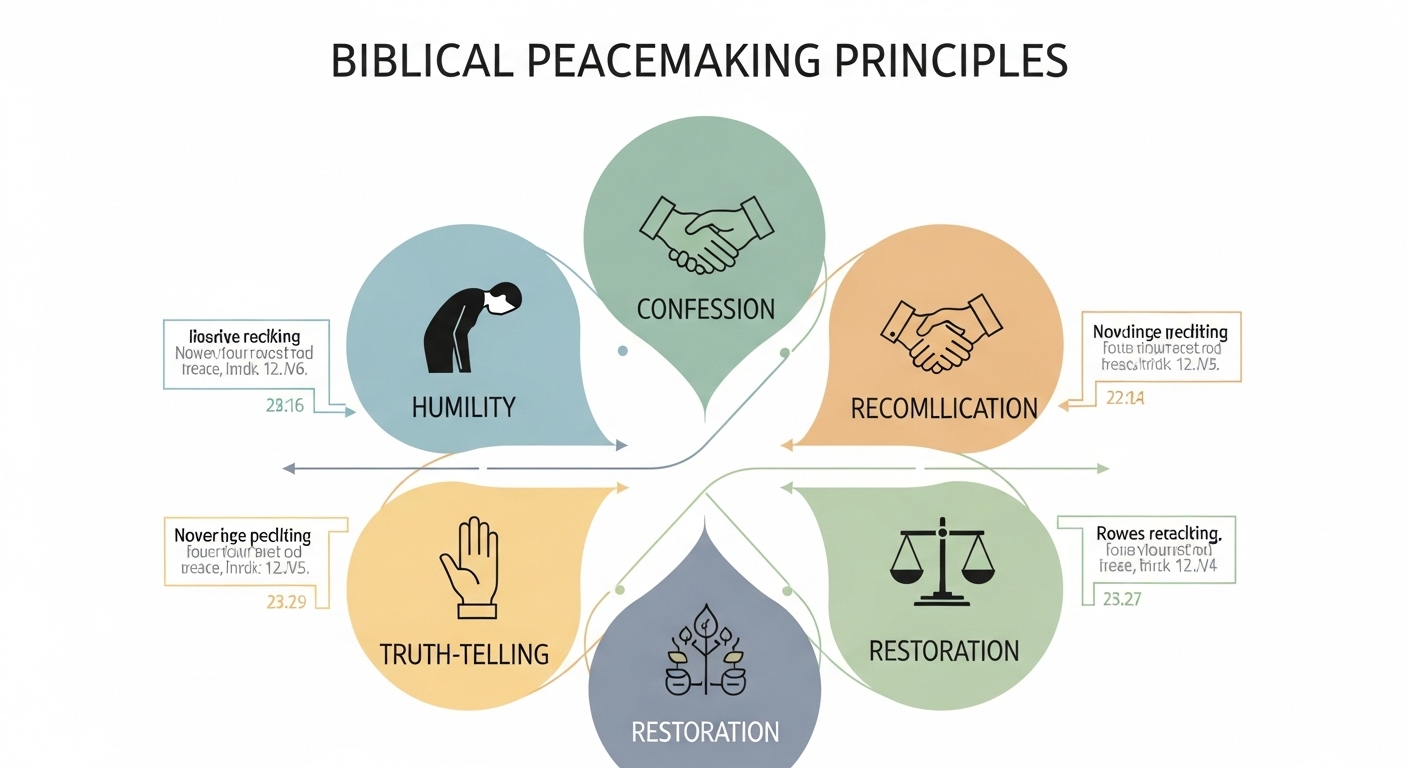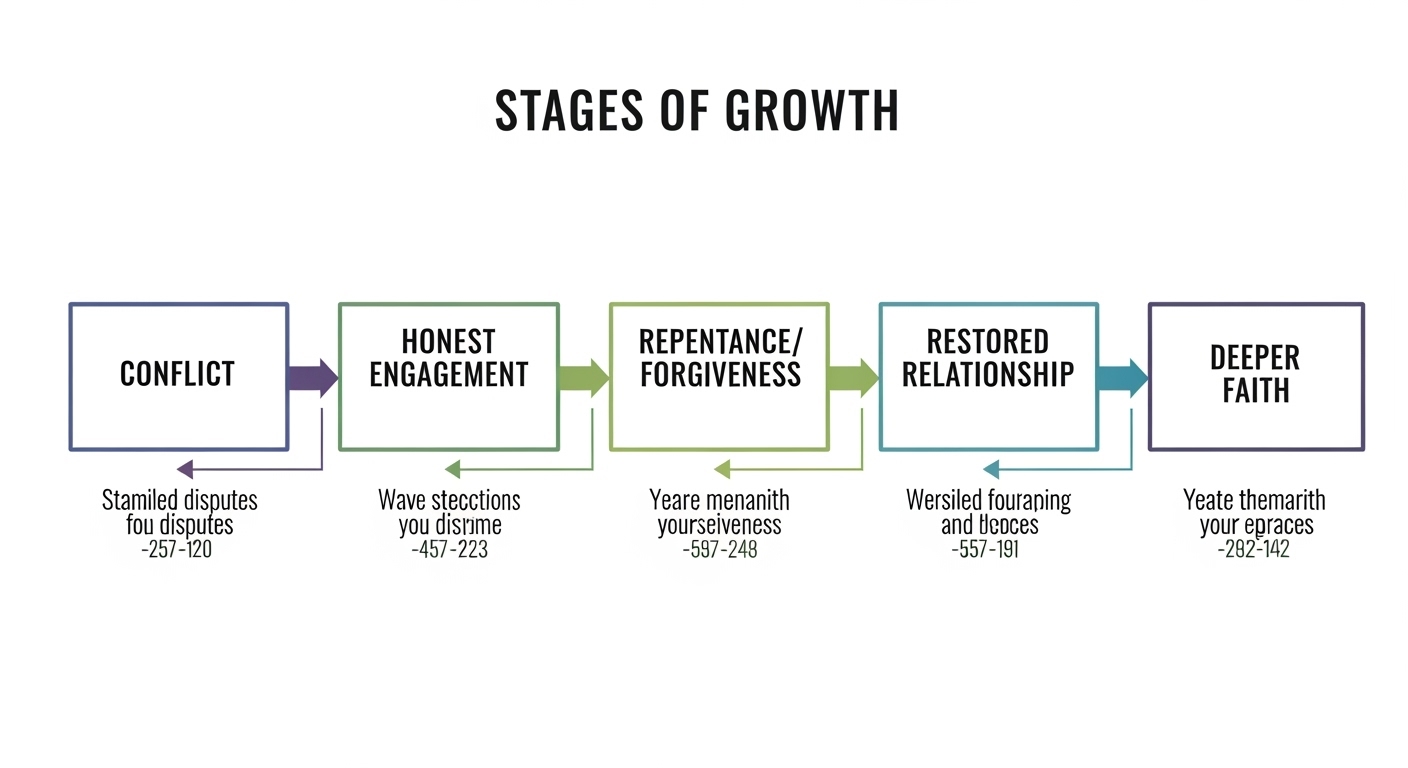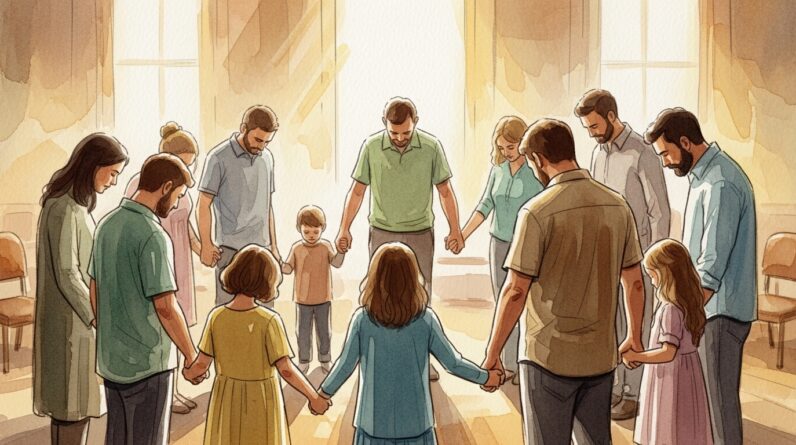Turning Conflict Into Growth: Lessons From Biblical Peacemakers

Conflict is one of those unavoidable parts of life that you can either let erode you or use to sharpen you. When you learn to handle disagreement biblically, what starts as pain can become an engine for character formation, deeper faith, and healthier relationships. In this article, you’ll explore how peacemaking in the Bible works not as a naive avoidance of conflict but as a deliberate, often costly, practice that produces spiritual and personal growth. You’ll see clear examples from Scripture, practical steps you can use today, and research-backed reasons why conflict—handled well—refines you, not ruins you.
Why conflict isn’t the enemy
You may feel like the quickest path to peace is to avoid every argument, sweep tension under the rug, or silence hard conversations. But Scripture and experienced peacemakers in the church tell a different story: avoiding conflict often leaves wounds unhealed and relational toxins to fester. The real question is how you handle conflict. Do you meet it with humility, truth, and a posture of restoration, or with defensiveness and avoidance?
Peacemaking in the Bible is rarely about being passive. Rather, it’s an active pursuit. Christ calls peacemakers “blessed,” implying that they play a distinct and valuable role in God’s kingdom (Matthew 5:9). When you learn to engage conflict with biblical wisdom, you open the door to transformation—of yourself, your relationships, and your faith. Psychological research supports this: growth often follows strain when people process conflict constructively. The key is not conflict itself but the posture you bring into it.
A biblical framework for peacemaking

To understand the mechanics of peacemaking in the Bible, you need a framework that blends truth-telling, humility, and restoration. Scripture gives both the heart and the steps for this work.
Peacemaking as an active pursuit
Being a peacemaker isn’t neutral. The Beatitudes praise those who actively cultivate peace: “Blessed are the peacemakers, for they will be called children of God” (Matthew 5:9). That blessing assumes you will step into tension, not simply applaud when others do. Peacemaking involves risk—risk of rejection, misunderstanding, or personal cost—but it also mirrors the work of Christ reconciling humanity to God.
Reconciliation as ministry
The apostle Paul frames reconciliation as central to the Christian mission: “God… has given us the ministry of reconciliation” (2 Corinthians 5:18-19). When you engage in peacemaking, you are participating in God’s restorative work. That means peacemaking carries dignity, responsibility, and spiritual weight. It’s not merely good advice; it’s ministry.
Humility, confession, and forgiveness
A biblical peacemaker embraces humility and the willingness to admit wrong. James frames trials as opportunities for perseverance and growth, and spiritual formation often shows up when you confess and receive correction (James 1:2-4). The Bible repeatedly pairs humility with restoration—Paul urges believers to “bear with each other and forgive” as Christ forgave you (Colossians 3:13-14). When you choose to confess and forgive, you create space for real healing.
Lessons from biblical peacemakers: case studies

You don’t have to guess how peacemaking works; Scripture gives you multiple stories where conflict becomes the crucible for growth. These case studies offer practical patterns you can mirror.
Joseph: betrayal turned to restoration
Joseph’s story moves from betrayal to reconciliation and is a masterclass in patience and grace. Sold into slavery by his brothers, he later rises in Egypt and eventually faces the men who harmed him. Rather than destroy them, Joseph chooses to provide, reveal his identity, and invite restoration—saying, “You meant evil against me, but God meant it for good” (Genesis 45:4-15). Joseph didn’t excuse sin, but he allowed God’s sovereignty and compassion to shape his response. From his story, you learn that long-view faith and a refusal to consume others with vengeance can convert conflict into a conduit of reconciliation.
The Good Samaritan: peacemaking beyond expectations
Jesus’s parable of the Good Samaritan reframes peacemaking as practical action toward the neighbor you least expect. The Samaritan didn’t get bogged down in identity politics or legalism; he saw a hurt person and acted with mercy (Luke 10:25-37). For you, this means peacemaking isn’t always a program or a sermon—sometimes it’s tending wounds, arranging care, and paying costs that restore human dignity.
Paul and Onesimus: advocacy, mediation, and restoration
The letter to Philemon gives a small but profound glimpse into apostolic peacemaking. Paul intervened between a runaway slave, Onesimus, and his master, Philemon, advocating for reconciliation and treating Onesimus as a brother in Christ (Philemon 1:8-21). Paul didn’t circumvent justice; he reframed the relationship around a new identity in Christ. When you mediate conflict, you should consider both restoration and accountability.
Barnabas: encouragement as peacemaking
Barnabas earned the nickname “son of encouragement” by bridging gaps, especially when others were fearful. He vouched for Paul to the Jerusalem church after Paul’s conversion, helping the community accept someone they distrusted (Acts 9:26-27; Acts 11:22-26). Peacemaking often requires someone to speak up for reconciliation, even when it’s risky. Your encouragement may be precisely the balm that heals a divided body.
Community restoration and discipline
Jesus and the apostles also give structures for dealing with entrenched sin: Matthew outlines a stepwise process for confronting a brother or sister, moving from private conversation to involving witnesses and the church if needed (Matthew 18:15-17). Paul instructs the church to restore the person with gentleness when someone is overtaken in a transgression (Galatians 6:1). These passages show peacemaking sometimes includes corrective action intended to bring repentance and healing.
How conflict refines character and faith

It’s a pastoral cliché to say “trials shape you,” and yet Scripture consistently connects suffering and struggle to spiritual formation. When conflict presses on the prideful parts of you, it exposes what needs refining.
Trials as testing that produces endurance
James links trials to endurance and maturity: “Consider it pure joy… whenever you face trials of many kinds, because you know that the testing of your faith produces perseverance” (James 1:2-4). When you engage in conflict with a posture of learning rather than winning, you let God use friction to produce perseverance and maturity.
Suffering that cultivates hope and character
Paul offers a theological lens: suffering produces perseverance, perseverance produces character, and character produces hope (Romans 5:3-5). If you can reinterpret conflict as a context for growth rather than just a threat to comfort, you’ll be more resilient and spiritually mature.
Scientific backing for growth from struggle
Psychology has a concept called post-traumatic growth—research by Tedeschi and Calhoun and others has shown that people can experience positive psychological change through struggling with highly challenging life circumstances. Similarly, studies on forgiveness and reconciliation by researchers such as Everett Worthington suggest that choosing forgiveness can reduce stress and improve mental health. When you pursue peacemaking in the Bible’s spirit—honest confrontation, restitution where possible, and forgiveness—you align with practices that researchers have linked to healthier outcomes.
Practical steps to practice biblical peacemaking today
You can read theology and admire biblical peacemakers, but transformation happens when you take practical steps. Below are actionable practices grounded in Scripture and supported by relational research.
Start with prayer and self-examination
Before speaking, examine your heart. Jesus expects you to address your own log before the speck in another’s eye—check your motives, confess pride, and ask God for a soft heart (Matthew 7:3-5). Prayer reorients your posture from self-protection to redemptive intent.
Seek private, humble conversation first
Matthew’s process for addressing sin begins privately. Approach the person gently and privately first—this reduces defensiveness and models humility (Matthew 18:15). When you initiate with care, you’re more likely to be heard and to open the door to reconciliation.
Speak truth with gentleness
Ephesians and Colossians urge you to speak the truth in love, putting off anger and bitterness (Ephesians 4:15; Colossians 3:12-14). Truth without tenderness wounds; tenderness without truth leaves problems unaddressed. Balance is the hallmark of biblical peacemaking.
Listen to understand, not to reply
Good listening is revolutionary in conflict. The apostle James warns of the damage speech can do; listening is a way to honor the other’s experience (James 1:19). Research in counseling and relational dynamics confirms that validated feelings and empathetic listening lower defensiveness and increase willingness to reconcile.
Involve wise third parties when needed
If private conversations fail, bring witnesses or elders as Matthew suggests (Matthew 18:16). Third parties can mediate, clarify facts, and bring accountability. Galatians’ instruction to restore gently when someone is overtaken in sin also implies community involvement and care (Galatians 6:1).
Forgive, but hold appropriate boundaries
Forgiveness is central to peacemaking, but it isn’t the same as naive trust. Forgiveness releases the debt of anger and vengeance; boundaries protect against ongoing harm. Paul models advocacy for reconciliation with wise boundaries by asking Philemon to receive Onesimus “no longer as a slave, but more than a slave” (Philemon 1:15-16). You can forgive while still seeking just and safe arrangements.
Practice restorative, not merely punitive, responses
Biblical peacemaking often seeks restoration that accounts for harm and repairs relationships. Restitution and repentance are part of this vision. When possible, encourage acts that restore what was broken—an approach consistent with both biblical justice and modern restorative practices.
Obstacles to peacemaking and how to navigate them
You’ll face real barriers when you attempt peacemaking: pride, fear, cynicism, trauma, or communities that reward silence. Recognizing these obstacles helps you plan realistic steps forward.
Pride and image management
Pride wants to protect its image and will win at any cost. You’ll need humility practices—confession, accountability partners, and regular self-examination—to counteract this. Scripture repeatedly exhorts humility as the foundation of restoration (Philippians 2:3-4).
Fear of vulnerability or further harm
If you’ve been hurt before, vulnerability feels risky. Here, boundaries and safe third-party involvement can protect while you pursue reconciliation. It’s wise to seek counsel from trusted pastors or counselors when trauma layers complicate reconciliation.
Systems that reward silence
Sometimes institutions or cultures tacitly reward keeping problems hidden. Addressing systemic silence might require publicizing patterns, advocating for structural changes, or calling for accountability in ways that balance truth and charity. Proverbs notes the danger of lacking counsel—seeking diverse, wise voices can help you avoid unlawful silence (Proverbs 11:14).
When not to reconcile immediately
There are situations—ongoing abuse, coercive control, or repeated harm—where safety must be prioritized over immediate reconciliation. The biblical imperative to love your neighbor includes protecting the vulnerable, so separation or legal measures may be necessary until genuine change occurs.
Community’s role in peacemaking
You don’t have to do this alone. The church is designed as a community of restoration where members bear one another’s burdens and restore those who fall.
Mutual bearing and restoration
Galatians instructs you to restore the fallen in a spirit of gentleness and to carry one another’s burdens (Galatians 6:1-2). When you bring conflicts into healthy community spaces, you create accountability, care, and a shared commitment to reconciliation.
Discipline as loving correction
Community discipline isn’t about shaming but restoration. Matthew’s process and Paul’s letters demonstrate that correction can be redemptive if it aims at repentance and restoration (Matthew 18:15-17; 2 Corinthians 2:5-8). When elders and peers participate in peacemaking, the results are more likely to be sustainable.
The church as a peacemaker in the world
When the church models peacemaking in the Bible, it becomes a visible testimony of reconciling grace. Your congregation’s willingness to face conflict faithfully will either attract or repel people looking for a trustworthy witness. Paul urges you to pursue peace with everyone, as far as it depends on you (Romans 12:18). This broad call asks you to steward relationships beyond your comfort zone.
Signs your conflict produced growth
How will you know the struggle actually refined you? Here are patterns to watch for as signs that peacemaking worked.
You’ll notice increased humility and reduced defensiveness. You’ll find yourself listening longer and arguing less. The relationship may not return to exactly what it was, but it will move toward a healthier, more honest place. You’ll often see a deeper empathy for the other person’s complexity and a strengthened trust in God’s sovereignty through the pain.
Scripture maps these outcomes: James’s testing results in perseverance and maturity (James 1:2-4); Romans promises character and hope born from suffering (Romans 5:3-5). Research on relationships also suggests that couples and groups that learn to repair after conflict often experience stronger bonds than those that never faced trials together. In short, growth looks like character, restored connection, and a more resilient faith.
Applying these lessons in everyday life
You don’t have to wait for a major crisis to practice peacemaking. Start small and build habits that prepare you for larger conflicts.
First, cultivate self-awareness through journaling and prayer. Second, practice empathy in low-stakes conversations—ask questions and listen to understand. Third, volunteer to mediate small disputes in your community or church under supervision. Fourth, learn restorative justice practices and study biblical models of restitution. These practices build your muscles for peacemaking in the Bible’s likeness.
Here are a few reflection questions you can use to guide immediate action:
- Who in your life needs a private conversation initiated with humility?
- Where is pride preventing you from confessing or receiving correction?
- What boundaries do you need to set to pursue forgiveness without inviting harm?
- Who in your community can you invite into the process of restoration?
Encouragement for the long haul
Peacemaking is rarely a one-time event; it’s a way of life. You’ll sometimes succeed and sometimes fail. The promise is not that you’ll always restore perfectly, but that God will use your faithful attempts to shape you.
Remember that peacemaking in the Bible is both posture and practice: it’s a heart aligned with God’s reconciling mission and the concrete steps you take to enact that mission. Your attempts to reconcile—even when they cost you—mirror Christ’s own costly work of reconciliation (2 Corinthians 5:18-19). That means your peacemaking participates in something far larger than your immediate wins or losses.

Final thoughts
Conflict is inevitable, but destruction is optional. When you practice peacemaking in the Bible’s spirit—humble confession, compassionate truth-telling, wise mediation, and restorative forgiveness—you allow God to turn friction into formation. The stories of Joseph, the Good Samaritan, Paul and Onesimus, Barnabas, and the teaching of Jesus offer a roadmap: choose restoration, accept risk, seek truth, and trust God for the outcomes.
If you want to grow in this, start small, seek wise counsel, and treat each difficult conversation as a practice field for spiritual maturity. Over time, you’ll see how conflict, handled biblically, refines your character, strengthens your relationships, and deepens your faith.
Explore More
For further reading and encouragement, check out these posts:
👉 7 Bible Verses About Faith in Hard Times
👉 Job’s Faith: What We Can Learn From His Trials
👉 How To Trust God When Everything Falls Apart
👉 Why God Allows Suffering – A Biblical Perspective
👉 Faith Over Fear: How To Stand Strong In Uncertain Seasons
👉 How To Encourage Someone Struggling With Their Faith
👉 5 Prayers for Strength When You’re Feeling Weak

📘 Jesus and the Woman Caught in Adultery – Grace and Mercy Over Judgement
A powerful retelling of John 8:1-11. This book brings to life the depth of forgiveness, mercy, and God’s unwavering love.
👉 Check it now on Amazon 🛒💥
🔥 “Every great message deserves a home online.” 🌍💬🏡
Don’t let your calling stay hidden. Start a Christian blog or website using Hostinger — with 99.9% uptime, a free domain, and SSL, your voice can shine for God’s glory anytime, anywhere.
💥 Begin today. 🛒 Try it RISK-FREE! ✅
✝️ “Your body is God’s temple — care for it with purpose.” 💪💖🏛️
Renew your energy and restore balance naturally. Mitolyn helps support a healthy metabolism, giving you the vitality to live out God’s calling with strength and confidence.
🔥 Unlock Your Metabolic Power! ⚡Burn More Calories & Feel Great With Mitolyn. 💪
👉 Start Today. 🚀 Check Price Now. 🛒💰
💰 As a ClickBank & Amazon Affiliate, I earn from qualifying purchases.
📖 Acknowledgment: All Bible verses referenced in this article were accessed via Bible Gateway (or Bible Hub).
🚀 Want to explore more? 👉 Dive into our new post on Why Jesus? and experience the 🔥 life-changing truth of the Gospel!





